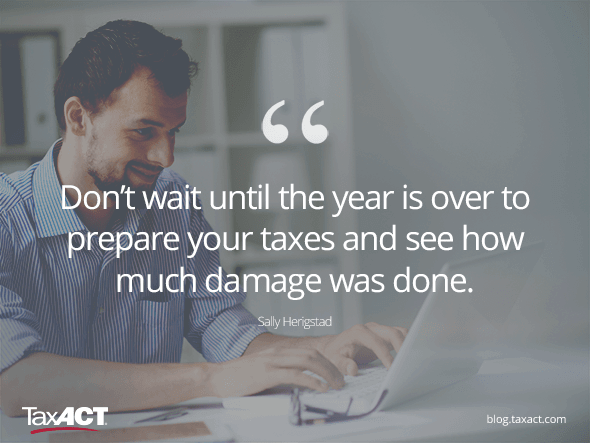Smart taxpayers plan their tax year. They don’t wait until the year is over, and then prepare their taxes and see how much damage was done.
The farther ahead you look to plan your tax situation, the better your chances of significantly reducing your tax burden – and better planning your financial future.
Follow these tips for planning next year’s taxes, before it’s too late:
First, run “what-if” scenarios for the new tax year.
You can use the Tax Calculator to perform ‘what-if’ scenarios for current and future tax years. This gives you a starting point for your tax planning.
For example, prepare a what-if scenario for the new year with no major changes, or with the most likely scenario. If your income is variable, you might also try high and low scenarios and see how they affect your tax bottom line.
Decide if bunching deductible expenses can help you.
For some expenses, you can only take a deduction to the extent they exceed a certain amount during a tax year.
If you spread out payments for a major expense over two or more years, you may get little or no tax benefit.
You could do what tax planners call bunching and pay more of one type of deductible expense in one year.
Here’s how bunching works.
Say you have a couple of kids who need braces. The orthodontist lets you pay all at once, or in payments over three years. You can only deduct medical expenses after they exceed 10% of your adjusted gross income (AGI) (7.5% if you or your spouse is over age 65).
If you spread out the orthodontia payments, you may never reach the 10% (or 7.5%) minimum or get a deduction.
However, by pushing the expenses for braces into one year, you could have 10% (or 7.5%) of your AGI in expenses in one year — and you may very well get Uncle Sam to help pay for those nice, straight teeth.
Try to match major deductions to high-income years.
You can’t always decide when to make deductible expenditures – but sometimes you can.
For example, say you need to buy expensive equipment for your small business. You could buy it in December or January, and let’s assume you will deduct the entire expense in one year.
The first impulse may be to purchase the equipment in December to take the deduction for the current year.
However, if this year’s income was on the slim side, and you expect to be in a higher tax bracket next year, consider putting off your purchase until January. You may get a significantly higher benefit from the deduction.

Know the rules for claiming dependents.
Claiming a dependent on your tax return can make a huge difference to your taxes.
The IRS allows you to take a $4,000 exemption for each dependent. In addition, you can claim certain expenses for dependents, such as childcare costs, medical expenses, and tuition payments.
It’s clear that your children who live with you all year are your dependents.
However, the rules can be a bit complex if you share custody of a child with someone, help support an elderly parent, or if a relative or nonrelative lives with you.
Sometimes, planning how much you spend in one year or how many days the dependent lives with you can make a significant difference in the tax benefit you receive.
Estimate your tax impact before you sell major assets.
Some of the best opportunities for saving taxes come when you expect to sell an asset.
For example, say you are thinking about selling the home you’ve lived in for 18 months. Its value has increased over the years, and if you live in and own the home just six more months – until the two-year mark – you may qualify to exclude all of the gain from your taxable income. (If you meet certain exceptions, such as a job transfer, you may be able to exclude the gain even if you don’t live in the home for the full two years.)
For stocks and other capital assets that have increased in value, think about keeping them longer than one year.
After the one-year mark, you’ll pay much lower capital gains tax rates.
Contribute to your retirement accounts throughout the year.
Sure, you can make your IRA contribution next April, right before you file your taxes. But will you have the money set aside then?
It’s much easier to contribute earlier in the year or to put money aside from every paycheck.
In addition, the sooner you put your money into a retirement account, the longer compound returns have to work their magic before you retire.
Contributing throughout each tax year, instead of afterward, is easier and helps you more effectively reach your financial goals.
TaxAct makes preparing and filing your taxes quick, easy and affordable so you get your maximum refund. It’s the best deal in tax. Start free now or sign into your TaxAct Account.





